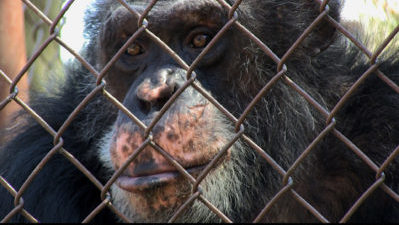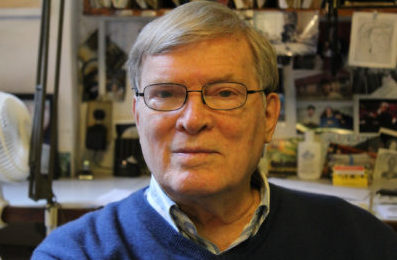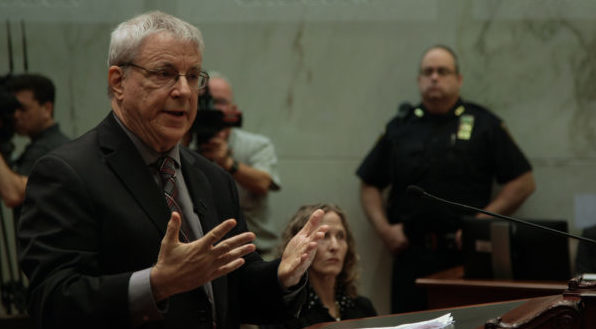INTERVIEW: Chris Hegedus, D.A. Pennebaker explore chimpanzee personhood in new film

Unlocking the Cage, which is currently playing at the Film Forum in New York City, follows animal-rights lawyer Steven M. Wise as he tries to convince the legal system to recognize chimpanzees and other intelligent animals as persons. By enacting the common-law precedent of habeas corpus, which challenges unlawful imprisonment, Wise and his legal team from the Nonhuman Rights Project have tried to make the case that holding these animals in captivity robs them of self-determination and their ability to exercise their personhood.
Chris Hegedus and D.A. Pennebaker, the directing team behind Kings of Pastry, The War Room and a host of influential, important music documentaries, follow Wise around upstate New York as the lawyer carefully selects and argues for a host of clients, including Merlin, Kiko, Hercules and Leo, all chimpanzees.
“Like almost all of our films, it kind of came through our door,” Hegedus said recently in a phone interview. “It was kind of the perfect time for us because we were looking for a new project, and we were actually sitting here kind of mourning our dog who had just died that was our mascot and came to the office everyday. So a film on an animal-rights issue seemed intriguing.”

Pennebaker said they don’t research topics before beginning a new project. Their education is found in the making of the actual documentary. “We don’t have any yellow pads around here,” Pennebaker said. “If we want to make the film, that’s how we find out everything we know about it.”
Unlocking the Cage, from First Run Features and HBO Documentary Films, is as much a legal film as it is an animal-rights documentary. Sometimes difficult concepts are argued about in the movie, but Wise proves to be a fascinating communicator and able to break down difficult principles into everyday language with specific examples. He makes for an interesting and engaging subject for Hegedus and Pennebaker.
“It was a very difficult legal subject and hard to get our minds around,” Hegedus said. “But because we explore the film while we’re making it, while we’re following the story, it just kind of came natural. And in some ways Steve was and the Nonhuman Rights Project, his team, were at the same time exploring exactly how they were going to mount their law case, what plaintiff they were going to use, which species and which state they were going to do it in, so just by being there was our education.”
One of the first sequences that Hegedus filmed involved Wise talking before a class at Harvard University. It was at this point that the co-director realized how self-effacing and funny their chosen subject can be. He was clear when explaining the principles to the students and obviously passionate about the issue of animal rights. Frustration and anger never entered his mind.

“He’s been teaching the idea of animal rights right from the beginning,” Hegedus said. “He was the one of the first people to teach this subject in any university.”
For Pennebaker, what endeared him to Wise was the fact that the lawyer would often litigate on behalf of dogs. Pennebaker was impressed with how Wise went into courts to save the lives of dogs about to be put down because they’ve bitten somebody. “As a dog owner, I really loved him,” he said.
And on the chimpanzees, Pennebaker said, Wise had “come to this notion that the only way to get them out of the cages was to make them persons because you can’t keep a person in a cage legally, and so if they were made legal persons, then that would save them from this terrible thing that happens to them everywhere in the name of science.”
Wise has written a couple books on the issue of animal rights, all likely leading to his epic legal struggle to find a sympathetic judge — and the backing of the public — to expand legal definitions in the chimpanzees’ favor.
For Hegedus, Wise fit the criteria for a good documentary subject: passionate, about to take a risk and caring.
Pennebaker said that being a fly on the wall for a documentary is never an attractive or interesting proposition. “I’d rather be a lobster on the wall if I had any choice,” he said with a laugh. “But the fact is we go into situations where almost always the person we are making the film about is somebody we like very much. We like him not just because he went to high school with us or something, but we think what he is doing is really important and interesting. And we want to be there when it happens. We want to watch it happen because otherwise history forgets you.”
But telling Wise’s story was not an easy one. His legal cases stretched on for months and included trips around the entire state of New York. There were many setbacks and few triumphs, although symbolically the lawyer achieved a great deal. There was also the issue of Hegedus and Pennebaker showing up with cameras. Some of the animal owners in the movie were not too keen on being filmed; however, this didn’t stop them from documenting.
“Steve [eventually] went after every chimpanzee he could find in New York state, and that really enlarged the scope of our film and made it more complicated,” Hegedus said. “And I suppose we could have just followed one case, but it seemed like … you want to see the diverging opinions of the differnet judges and how they were going to grapple this very novel idea of giving a right, a legal right, to an animal.”
The portraits of certain chimpanzees in Unlocking the Cage can be depressing and troubling to viewers. Some of these animals live sad and un-wild existences. One animal is dressed up to take part in karate; another chimpanzee is caged near a dilapidated complex housing reindeer. Two chimpanzees, named Hercules and Leo, were involved in research with the State University of New York at Stony Brook, according to the website of the Nonhuman Rights Project.
The fraught debate presented challenges to the documentary filmmakers.
“Well, everything was off limits in some ways,” Hegedus said. “Even when I went upstate with Steve to find the other chimpanzee plaintiffs, it was on a very low-key level that we discovered these chimpanzees and researched them because we really didn’t want the owners to remove them from the state … [and] put them into some other worse type of captivity.”

Much of Unlocking the Cage was filmed by Hegedus on a small scale. Because of budgetary reasons, they needed to keep the production elements to a minimum, but that also helped them stay under the radar and not overpower Wise when he entered a room.
The judges in the film are certainly varied in their responses. Some of them seem confused over the what Wise is asking for; another one is sympathetic to his pursuits. For Pennebaker, these little dramas were enticing.
“Basically the secret ingredient of every story is: then what happens,” Pennebaker said. “We’re caught in that web ourselves because we get to the point where he has one case, and he files another one. And you want to see is it possible that a man, one lawyer who’s basically a dog lawyer, can he change a law that’s been around for hundreds of years. It’s common law that he’s going after. You want to be in the courtroom with a camera when the judge says, ‘You know, I think you got something here.’ And that’s what we’re after really.”
The constant news coming from the Nonhuman Rights Project caused the team to change the ending of Unlocking the Cage since it premiered at the Sundance Film Festival earlier this year. As each legal decision was made, Wise adapted his strategy and improved his approach on behalf of the animals. Backing him up are a team of legal advisers, plus primatologists who have provided expert opinions on the intelligence of chimpanzees. In the future, he hopes to include cetaceans (whales and dolphins) and elephants in his cases. His ultimate goal is to find proper sanctuaries for these caged animals and also to have the world start thinking about them in a kinder way, more personal way.
Throughout the cinematic journey, Wise remained positive and cheerful. “I kind of was wishing he would cry once in a while,” Hegedus admitted. “It’s an amazing aspect of Steve. He’s been doing this so long, and as he says in the beginning, people used to balk at him when he walked into a courtroom.”
Pennebaker added: “I think he feels that there is a kind of change taking place in our culture, and people are thinking differently about animals. And I suspect it’s because a lot of us have stopped eating them, but for whatever reason, I think there’s a kind of new future for animals that’s looming ahead. And he sort of senses it, and it’s one of the things that pushes him on.”
By John Soltes / Publisher / John@HollywoodSoapbox.com
Unlocking the Cage is currently playing at the Film Forum in New York City. Click here for more information.

